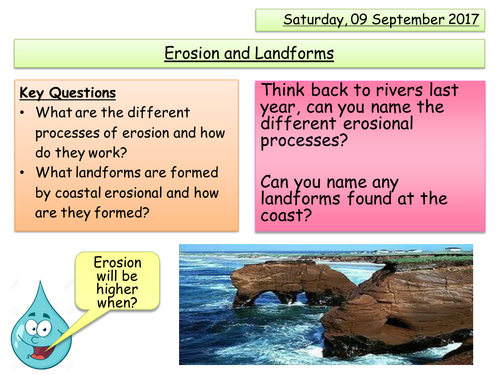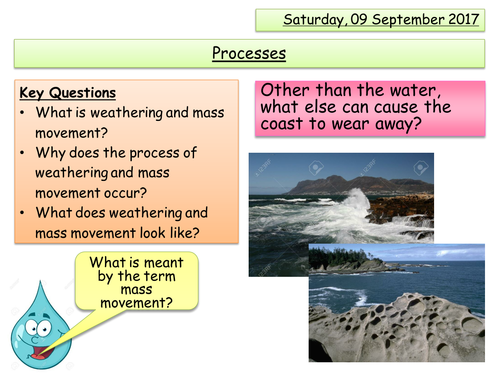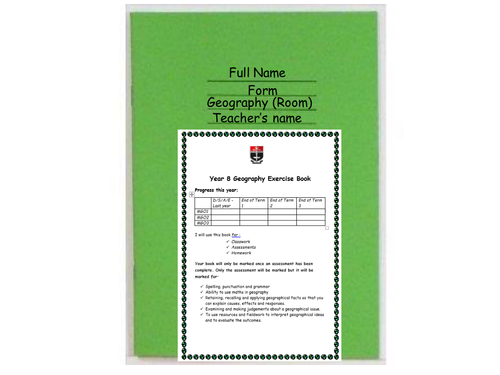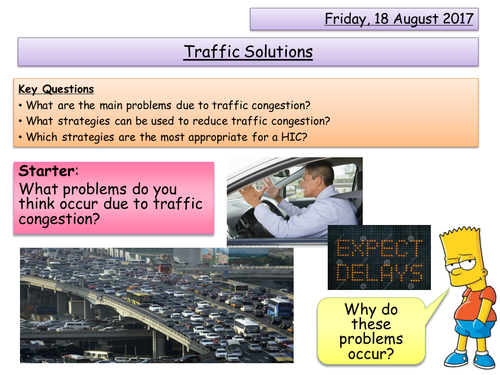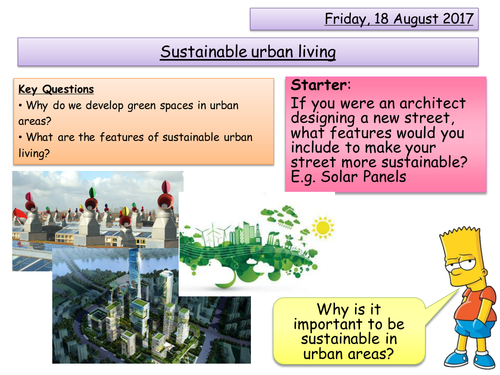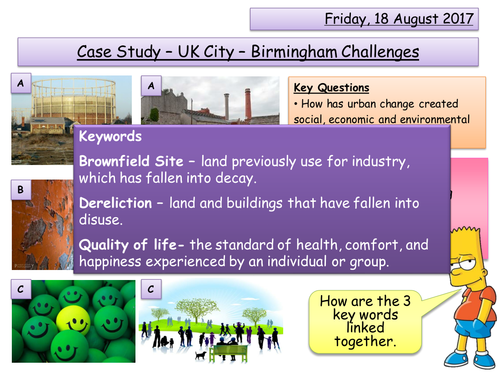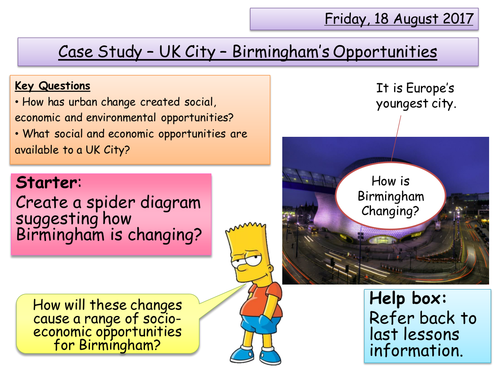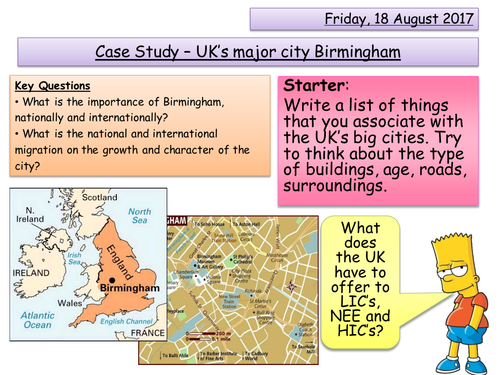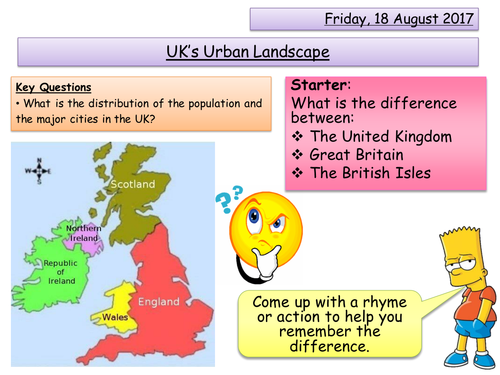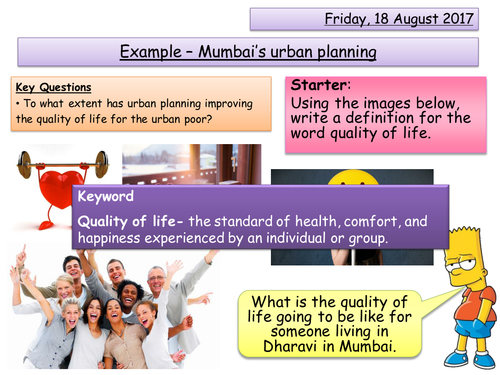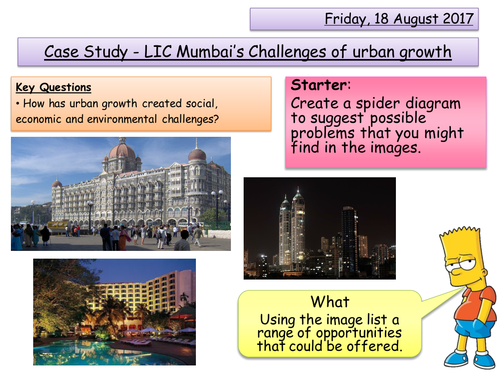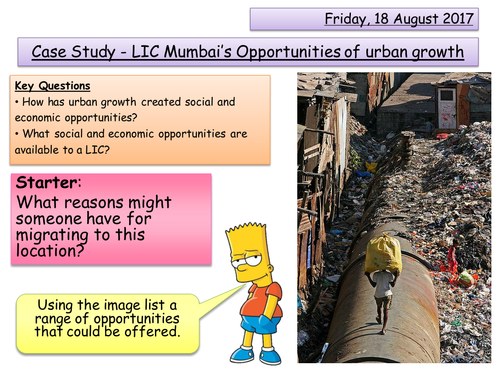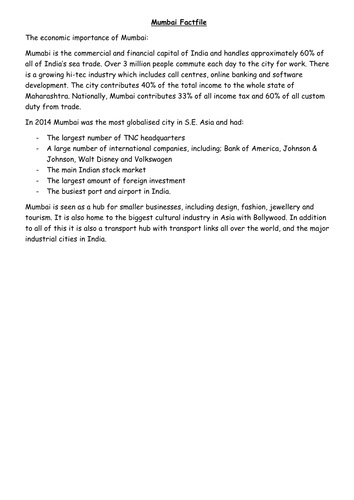
156Uploads
234k+Views
294k+Downloads
All resources

Erosional Landforms - Coasts
This lessons aims to allow students to gain an understanding of the different erosional processes that occur along the coast, followed by how these create a range of coastal landforms.
By the end of the lesson students will be able to answer the following key questions:
- What are the different processes of erosion and how do they work?
- What landforms are formed by coastal erosional and how are they formed?

Weathering and Mass Movement
This lesson aims to allow students to gain an understanding about how the processes of weathering and mass movement affect the coastline.
By the end of the lesson students will be able to answer the following key questions:
- What is weathering and mass movement?
- Why does the process of weathering and mass movement occur?
- What does weathering and mass movement look like?

Waves
This lesson aims to get students to gain an understanding of the different types of waves and to understanding the factors influencing tides.
By the end of the lesson students will be able to answer the following key questions:
- What causes tides?
- How are waves different?
- Why do waves break?
Bundle

Urban Issues and Challenges
This bundle contains every lesson required to teach the urban issues and challenges unit located in the AQA GCSE specification. It comes complete with lessons, activities, resources and worksheets. Please note that there is reference to a textbook, this is the Cambridge book. However all resources have a fact file attached that provides all the information required to complete the activities.
Bundle

A Major UK City - Birmingham
This bundle contains all the lessons required to teach 'Urban change in cities in the UK leads to a variety of social, economic and environmental opportunities and challenges'. This is found in the AQA GCSE specification.
Bundle

A Major LIC or NEE City
This bundle contains all lessons required to cover the Urban growth creates opportunities and challenges for cities in LICs and NEEs, located in the AQA GCSE Specification.

Traffic Congestion and Solutions
This lesson is based around the new AQA GCSE Specification. This is a lesson in the unit titled Urban Issues and Challenges. The main aim of this lesson is cover the following element of the specification:
- How urban transport strategies are used to reduce traffic congestion.

Sustainable Urban Living
This lesson is based around the new AQA GCSE Specification. This is a lesson in the unit titled Urban Issues and Challenges. The main aim of this lesson is cover the following element of the specification:
Features of sustainable urban living:
• water and energy conservation
• waste recycling
• creating green space.

Urban Regeneration - Birmingham
This lesson is based around the new AQA GCSE Specification. This is a lesson in the unit titled Urban Issues and Challenges. The main aim of this lesson is cover the following element of the specification:
An example of an urban regeneration project to show:
• reasons why the area needed regeneration
• the main features of the project.
NOTE: If page numbers are mention then the figure is either already on the powerpoint or all relevant writing can be found in the factfile provided. If you would prefer to use the actual textbook this is the Cambridge gcse book.
NOTE: This lesson is good to follow on from my other lessons on Birmingham which are linked to the UK’s major city element.

Major UK City - Birmingham's Challenges
This lesson is the first part of the major UK city you must cover in the new AQA GCSE specification. This lesson aims to cover the following element from the specification:
How urban change has created challenges:
• social and economic: urban deprivation, inequalities in housing,
education, health and employment
• environmental: dereliction, building on brownfield and
greenfield sites, waste disposal
• the impact of urban sprawl on the rural–urban fringe, and the
growth of commuter settlements.

Major UK City - Birmingham Opportunities
This lesson is the first part of the major UK city you must cover in the new AQA GCSE specification. This lesson aims to cover the following element from the specification:
How urban change has created opportunities:
• social and economic: cultural mix, recreation and
entertainment, employment, integrated transport systems
• environmental: urban greening
NOTE = When it refers to page numbers, please use the factfile attached

Major UK city - Birmingham's Importance
This lesson is the first part of the major UK city you must cover in the new AQA GCSE specification. This lesson aims to cover the following element from the specification:
- The location and importance of the city in the UK and the wider
world
- Impacts of national and international migration on the growth and
character of the city
NOTE = When it refers to a page number please use the factfile attached.

UK's Urban Landscape
This lesson is based around the new AQA GCSE Specification. This is a lesson in the unit titled Urban Issues and Challenges. The main aim of this lesson is cover the following element of the specification:
- Overview of the distribution of population and the major cities in the UK.
NOTE = When it refers to a page number the table is provided on the actual powerpoint, you will just need to enlarge this for students to see.

Urban Planning - Mumbai
This lesson is based around the new AQA GCSE Specification. This is a lesson in the unit titled Urban Issues and Challenges. The main aim of this lesson is cover the following element of the specification:
An example of how urban planning is improving the quality of life for the urban poor.
NOTE = This lesson follows on nicely from the major city lessons which focus on Mumbai.

A Major City - Mumbai's Challenges
This lesson is the third part of the major city you must cover in the new AQA GCSE specification. This lesson aims to cover the following element from the specification:
- how urban growth has created challenges:
• managing urban growth – slums, squatter settlements
• providing clean water, sanitation systems and energy
• providing access to services – health and education
• reducing unemployment and crime
• managing environmental issues – waste disposal, air and water pollution, traffic congestion.

A Major City - Mumbai's Opportunities
This lesson is the second part of the major city you must cover in the new AQA GCSE specification. This lesson aims to cover the following element from the specification:
- how urban growth has created opportunities:
• social: access to services – health and education; access to
resources – water supply, energy
• economic: how urban industrial areas can be a stimulus for
economic development
NOTE - When it refers to page numbers please refer to the factfile document attached.

A Major City - Mumbai's Importance
This lesson is the first part of the major city you must cover in the new AQA GCSE specification. This lesson aims to cover the following element from the specification:
- The location and importance of the city, regionally, nationally and internationally.
- Causes of growth: natural increase and migration
NOTE = When it refers to a page number please use the factfile provided.

Migration and Urbanisation
This lesson is based around the new AQA GCSE Specification. This is the second lesson in the unit titled Urban Issues and Challenges. The main aim of this lesson is cover the following element of the specification:
- Factors affecting the rate of urbanisation – migration (push–pull theory), natural increase.

Urban Growth
This lesson focus on the new AQA GCSE specification. It is the first lesson lesson in the unit titled Urban Issues and Challenges. This lesson covers the following elements from the specification:
- The global pattern of urban change.
- Urban trends in different parts of the world including HICs and LICs.
Bundle

Making Connections - Welcome to Geography
This bundle contains a complete unit of work titled Making Connections. This is aimed for year 7's and is an ideal unit to begin the academic year. It looks at the different types of geography, the UK's physical and human features, locating continents and oceans, how to use an Atlas and some fieldwork based within your own school grounds.

